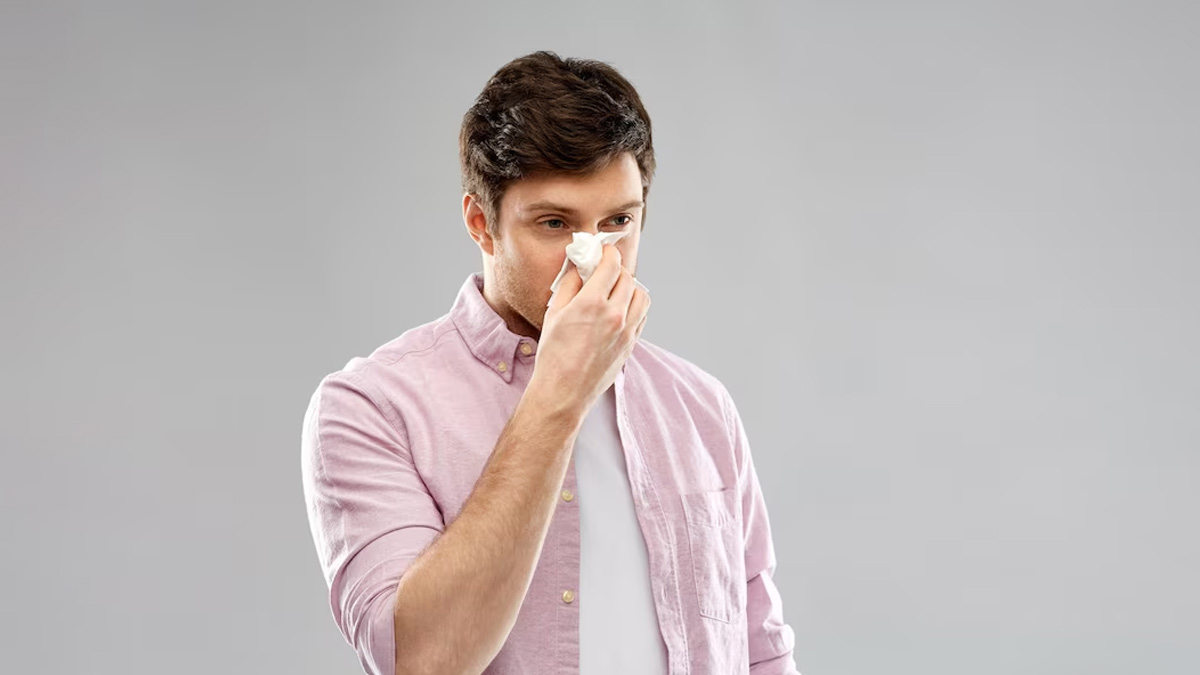
If you’re someone who regularly wakes up with a stuffy nose, even without a cold or flu, then you’re not alone. It is a common problem with some common solutions. However, identifying the cause is of utmost importance. Many factors can lead to a congested nose, and each has its own treatments and preventive care.
Table of Content:-
Speaking with the OnlyMyHealth team, Dr Vijay Verma, Consultant, Allergy & ENT Specialist, CK Birla Hospital, Gurugram, shares some of the possible causes and the treatment approaches depending on what you have.
Also Read: 5 Ayurvedic Home Remedies to Cure Nasal Congestion
What Causes Stuffy Nose On Waking Up?

Stuffy noses, also called nasal congestion, while mostly harmless, can cause a lot of discomfort and irritation. It is characterised by a feeling of fullness in the nose or face or might lead to fluid dripping out of the nose or back in the throat.
Many things can cause nasal congestion when you wake up. However, some of the most common causes include:
Allergies: Congestion in the nose can be brought on by allergic reactions to dust mites, pollen, pet dander, and other allergens.
Sinusitis: Inflammation of the sinuses, can cause pressure and discomfort in the face as well as congestion in the nose.
Dry air: Nasal passages can get dry and irritated when sleeping in a dry environment, which can result in congestion.
Additionally, sleeping in certain positions, especially lying flat on your back, can lead to fluid accumulation in the nasal passages and contribute to congestion, says Dr Verma.
How To Know If It Is An Allergy?

There are many allergies that might lead to a stuffy nose. These include:
Seasonal allergies: Pollen from trees, grasses, and weeds can trigger allergic reactions.
Perennial allergies: These allergies are present year-round and can be triggered by allergens such as dust mites, pet dander, mould, and cockroach droppings.
Allergic rhinitis: This condition refers to allergies that cause inflammation of the nasal passages, leading to symptoms like sneezing, nasal congestion, and itchy, watery eyes.
Allergic conjunctivitis: In addition to nasal symptoms, allergies can also affect the eyes, causing redness, itching, and watering.
Dr Verma says, “If you suspect that your stuffy nose is due to allergies, there are some signs that can help you identify it.” Some common and consistent symptoms include:
- Sneezing
- Itchy eyes
- A runny nose
In addition, it is also important to pay attention to potential triggers that worsen your symptoms, such as exposure to pollen, dust, pet dander, or certain foods, the doctor adds.
Could Stuffy Nose Occur Due To An Underlying Condition?
In certain cases, chronic conditions can also lead to nasal congestion or a stuffy nose, according to Dr Verma.
A deviated septum occurs when the thin wall (nasal septum) between your nasal passages is displaced to one side. This structural abnormality can obstruct airflow, leading to difficulty breathing through one or both nostrils and nasal congestion.
Vasomotor rhinitis is a chronic condition characterised by nasal congestion and a runny nose that is not caused by allergies or infections.
Gastroesophageal Reflux Disease (GERD) is a chronic digestive disorder that can cause stomach acid to flow back into the oesophagus, leading to heartburn and other symptoms.
Also Read: Spring Is Here And So Are Seasonal Allergies: Tips To Treat And Prevent Symptoms
How To Treat Stuffy Nose?

As per the doctor, treating a stuffy nose depends on the underlying cause. It is best to consult a doctor to determine the cause of your condition.
However, some general approaches and remedies that can help alleviate nasal congestion include:
- Inhaling steam from a bowl of hot water or a steamy shower can help moisten nasal passages and loosen mucus, providing temporary relief from nasal congestion.
- Applying a warm compress over the nose and sinuses can help soothe inflammation and reduce nasal congestion.
- Drinking plenty of fluids can help thin mucus and promote drainage, reducing nasal congestion.
- Keeping your head elevated while sleeping can help reduce nasal congestion by preventing mucus buildup in the nasal passages.
- Avoid exposure to cigarette smoke, strong odours, and other irritants that can exacerbate nasal congestion.
Conclusion
Waking up with a stuffy nose can be discomforting. Sometimes, it can even interfere with daily activities. While it is mostly harmless, consulting a doctor can help determine what the cause of the problem is, which in turn can help find the right treatments and lay down the best plan of action to prevent the same.
Also watch this video
How we keep this article up to date:
We work with experts and keep a close eye on the latest in health and wellness. Whenever there is a new research or helpful information, we update our articles with accurate and useful advice.
Current Version